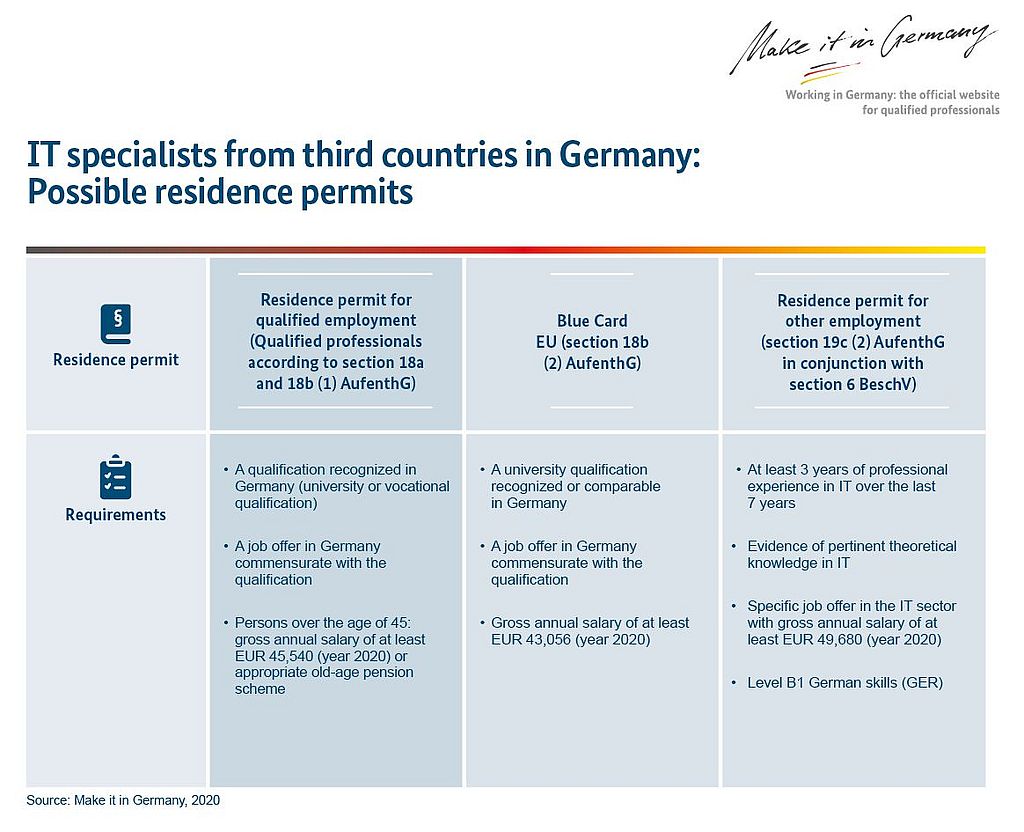
Expand search field: Attracting skilled IT workers from abroad
10 December 2020 - Our daily routine is ruled by digital applications and intelligent technologies today, and life without them is unthinkable in virtually every sector of the economy. This is why the demand for IT specialists is particularly high. According to Germany's digital association Bitkom, there are 2,600 IT specialists for every 100,000 employees subject to social insurance contributions in Germany – and the trend is rising. The industry association took stock of the situation in August 2020. A year earlier, the digital association reported a record number of job openings in the IT sector1. A survey of companies also revealed that 124,000 job vacancies for IT specialists were left unfilled nationwide. The demand for qualified professionals within the IT sector remains high and is still rising. This is hardly surprising given that the IT industry is one of the most innovative sectors in Germany and, with an annual turnover of 163.5 billion euros, acts as a driving force behind the German economy.
The high demand for skilled IT workers makes it hard for businesses to fill job vacancies with suitable applicants. This is why it is worth looking abroad.
Seize the opportunity: Recruit IT specialists from abroad
As the strongest economic power in Europe, Germany is a popular destination for many skilled workers from abroad. Skilled workers from the European Union (EU) and European Economic Area (EEA) are an important potential labor force for many German companies as they enjoy freedom of movement within the EU, which means that there are no restrictions on working in Germany. According to current figures, the number of EU nationals stands at 2,257,643 people and thus accounts for more than half of foreign workers in Germany2. In the meantime, however, the challenges of the digital transformation are also becoming noticeable in other EU economies, so there are similar shortages of IT specialists in many EU states. Companies can therefore take advantage of the new regulations by recruiting skilled workers from so-called third countries.
Here's why: The German Skilled Immigration Act (FEG), which came into force in March 2020, opens up improved opportunities for IT specialists who do not come from the EU/EEA to access the German labor market. Not only do the changes to qualifications, the visa procedure, language level and the prospects for staying make Germany an attractive destination for IT specialists, they also expand the horizons of businesses in Germany when looking for qualified IT personnel.
What are the entry routes for IT specialists from non-EU states?
There are various ways in which IT specialists from third countries can acquire the right of residence in Germany in order to work in their sector:
Visa for qualified professionals
If a formal education exists, i.e. if the specialist has a professional or academic qualification in the field of IT, they may apply for a visa for qualified professionals pursuant to section 18a or 18b of the German Residence Act (AufenthG). The visa or residence permit is normally issued if it has been recognised that the international qualification is comparable to a German one, there is a concrete job offer and the Federal Employment Agency (BA) has granted approval for employment (sections 18, 18a, 18b of the German Residence Act). The priority check (Vorrangprüfung)3 is no longer required.
EU Blue Card for academic specialists
The EU Blue Card is valid throughout Europe and enables highly qualified professionals from third countries to enter the European and hence the German labor market more quickly.
IT specialists may apply for the EU Blue Card if they have a qualification that is recognised as a university degree in Germany. Unlike the “residence permit to perform skilled work” under the terms of section 18b (1) of the German Residence Act, the EU Blue Card requires the future job to attain a minimum annual salary (see graphic). This minimum salary for skilled IT workers is EUR 43,056 in 2020, because IT jobs are classed as one of the shortage occupations in Germany4.
The Federal Employment Agency (BA) must also approve the employment of the skilled worker in order for the EU Blue Card to be issued (without the priority check).
Visa as an IT specialist with significant work experience
The German Skilled Immigration Act has made it possible for international IT specialists to find their way into the German labor market. It enables applicants from third countries to obtain the approval of the Federal Employment Agency (BA) for employment in the IT sector without the need for formal recognition of their qualifications (Section 6 German Employment Regulation (BeschV)). However, the following requirements must be met:
- The applicant is able to demonstrate at least three years of professional experience in the IT sector in the last seven years. The existing professional experience must correspond to to the occupation that the qualified professional intends to practice.
- There should also be evidence of relevant theoretical knowledge based on training courses and examinations.
- The qualified professional has a concrete job offer. This post must come with an annual salary amounting to at least 60 % of the annual contribution assessment ceiling in the statutory pension and unemployment insurance system. A salary threshold of EUR 49,680 applies in 2020.
- The applicant must be proficient in German at Level B1 of the Common European Framework of Reference for Languages (CEFR). The requirement to provide evidence of knowledge of German may be waived in individual cases where German is not the working language.
- The Federal Employment Agency (BA) has approved the employment of the foreign skilled worker.
If these requirements are met, a residence permit for employment purposes may be granted pursuant to section 19c (2) of the German Residence Act.
Tip: If you are an employer who would like to bring her or his qualified professional to Germany quickly, you may apply for the fast-track procedure for skilled workers in accordance with section 81a of the German Residence Act (AufenthG). This option allows you to fast-track the administrative procedure leading up to the issue of the relevant visa for your qualified professional. Information on advisory services, contact persons and essential documentation can be found on Make it in Germany.
Further information on Make it in Germany
Sources and notes:
(1) Bitkom, "There are 2,600 IT specialists for every 100,000 employees in Germany", press release 8/21/2020: https://www.bitkom.org/Presse/Presseinformation/Auf-100000-Beschaeftigte-kommen-2600-IT-Spezialisten
(2) Federal Employment Agency, workers by nationality (quarterly figures), March 2020: https://statistik.arbeitsagentur.de/SiteGlobals/Forms/Suche/Einzelheftsuche_Formular.html?nn=25122&topic_f=beschaeftigung-eu-heft-eu-heft
(3) The priority check examines whether the concrete job offer can be filled by a person who is a registered jobseeker in Germany. The priority test is considered to have been passed if the employer can give good reason as to why there are no suitable candidates among the unemployed entitled to preferential access.
(4) Different salary thresholds apply in Germany for the EU Blue Card: As a rule, a gross annual salary must amount to at least two thirds of the annual contribution assessment ceiling in the statutory pension insurance system. A lower annual salary of at least 52 % of the annual contribution assessment ceiling in the statutory pension insurance system applies to occupations in the fields of mathematics, IT, natural sciences, engineering and human medicine. Accordingly, therefore, the minimum gross salary for jobs in the fields of mathematics, IT, natural sciences, engineering and human medicine is EUR 43,056 in 2020 and EUR 55,200 for all other occupations.
Do you have any questions?
Let us advise you on your opportunities to work and live in Germany. Our experts will support you with questions regarding job search, visa, recognition and learning German.
You can find out more about the various contact options by clicking on one of the icons in the bar below.

